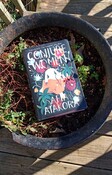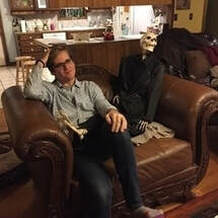Sacred Chickens
Menu
SACRED CHICKENS
 Conjure Women Author, Afia Atakora by Jarad Johnson “Freedom was a word with weights. It meant deciding to stay or go.” First novels are, by and large, a toss up. Some authors are most known for their first novels. Some authors prefer not to talk about them. They can be revelatory or they can fall short of the expectations for that genre. After reading Conjure Women, I can definitively say that Afia Atakora should be proud of her first novel. At its heart, Conjure Women depicts a mother and daughter who share a talent for the healing arts and conjure. There are many fascinating elements of African Spirituality, Hoodoo, and folklore. Haints abound. Set in the south before and after the Civil War, this book follows three women. Miss May Belle, a slave on a plantation, her daughter Rue (a fitting name, as it is considered the herb of protection in many traditions), and Varina, the daughter of the slave owner named Marse Charles, where Rue and her mother were enslaved. May Belle is a wise woman, skilled in the arts of healing and conjure. She and her daughter are permitted to live in a cabin by themselves, a rare luxury. She knows the ways of healing (and poisoning) plants. She is a midwife and delivers all the babies on the plantation. She also treats disease (notably treating genital warts on marse Charles) and removes curses. This affords May Belle a certain amount of privilege on the plantation, as she is both respected and feared. But this is not all encompassing. We see that her tenuous safety, for her and her daughter, comes at a price. Marse Charles rapes her in one scene. The reader doesn’t know how often this happens, but it is implied that this is not the first time. Also, she displeases him one time, and he drags her by her hair to the church on his property, and puts her what is essentially a dungeon beneath it; a hole in the ground, muddy, dark, and full of rats. For three days. Up until this point in the book, the reader doesn’t really see May Belle as a slave. She is distinctly written differently, in the way people treat her and the way she treats them. After that, the reader knows that even someone with as much innate power as May Belle is at the mercy of the dehumanizing system in which she’s trapped. Because of this, May Belle didn’t often defy Charles, at least openly, knowing how tenuous her situation is. It helps too that people fear her and her conjure. But, in her own way, she does rebel as much as possible. She has a lover, a man from another plantation, whom she believes to be Rue’s father. Furthermore, there’s a scene where a slave comes to her and asks her for conjure to help her escape. The first time, she tells her to follow the river and travel by night. The woman gets caught and is quite literally dragged back and whipped. She goes to May Belle again to ask for help, and May Belle uses her conjure to help her. This is more of a magical realism moment in the story, as the may Belle turns the woman who was trying to escape into a bird. According to the book, the woman eventually make it to freedom. Her daughter, Rue, is a lot like her mother. Strong willed, skilled in the healing arts, and complicated. Like her mother, she becomes the midwife and healer to the community of former slaves. However, once a sickness grips the children there, she becomes the one they blame. She had helps birth a child named Bean, who was born with a caul over his face, which according to folklore means that he will have the second sight. Because of her special relationship with this child, people became suspicious of Rue, branding her a witch - a very different term than conjurer. Traditionally in the African belief systems I’ve read about, “witch” only means an evil doer. People begin to spit where Rue walks, a sign against witchcraft. The entire town slowly turns against her. Rue’s transition to outsider is one of the most compelling aspects of the novel. When you study the witch trials, you hear about how many of the women were outcasts, single, or healers who people had a grudge against. But here, you see that in action. The process by which her friends and neighbors, and the entire town, turned against her is insidious.. She eventually wins their favor back, with the help of an alcoholic preacher (we don’t have time to cover that storyline, fascinating though it is. Read the book!) Rue also has a secret. Varina, the daughter of the master of the plantation, has been presumed by her family to be in the north this entire time (seven years after the end of the Civil War) to have been running the plantation. She has not. She has been hiding, under the direction of Rue, in the old church because Rue told her that the war was still going on. It was the only way Rue knew of ensuring that they never had to be subjugated. Varina has led a very interesting life. She had to navigate the strict societal order of being a southern belle, expected to marry and have children, and bring her father more wealth. However, she became pregnant after being raped at one of her father’s soirees and was then un-marriageable. I confess to feeling rather apathetic about Varina. She was a side character, and her life was indeed tragic, but I think either she wasn’t given enough pages to make an impact or her character, as it was, was very unrelatable or unsympathetic. I will say, that if I had one criticism, it would be that the book dragged a bit in the middle. I lost interest for a little while, and I feared that the rest of the novel would be like that. But it wasn’t, and I found the rest of the novel to be very compelling. Atakora, overall, wrote a stunning novel that not only celebrated African Spiritualism, but also showcased the horrors of slavery. Usually, we read about slavery in a broader sense. But this was up close and personal. Her writing style is similar to that of Zora Neale Hurston’s, so if you’re familiar with her style, you will enjoy Atakora’s!  Bio: Jarad recently graduated from college at MTSU, loves tea and coffee, and tries to spend every spare second reading. He has been a fervent gardener for 6 years and is fascinated by all related topics and has spent the last several years writing about this passion. He believes that nature is our greatest teacher. He majored in English with a concentration in literature and plans to pursue and master’s degree in Ecocriticism.
0 Comments
Leave a Reply. |

Click Photo above to buy ebook or paperback from Amazon.
Here's the link to Barnes and Noble Or order through your favorite independent bookstore! Categories
All
|
 RSS Feed
RSS Feed